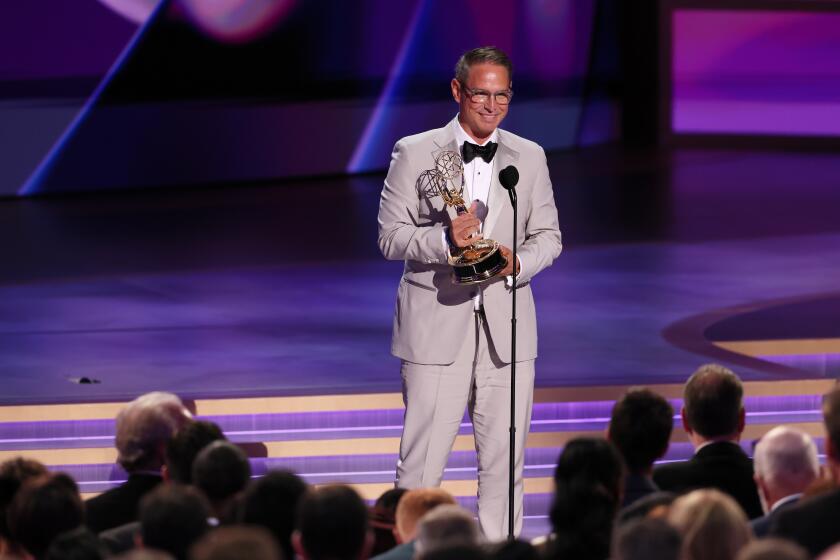FRESH FACES GET A LOOK
- Share via
Whether enduring an outcry over failing to nominate shows that are tops in the ratings or hearing criticism about tapping the same shows every year, the television academy has fielded its fair share of knocks over its annual Primetime Emmy Awards. And when the Board of Governors announced rule changes this year that shuffled around a few ancillary categories and allowed for six nominations instead of five in some of the major races, pundits were quick to register their displeasure.
But the TV academy’s senior vice president of awards, John Leverence, says that the Emmys are unique among the industry’s many kudos. “We have repeating series,” he says. “If we were just running a competition in which we dealt with miniseries, variety-music specials and those one-offs, then you wouldn’t have the perceived sameold same-old.”
Now that the dust has settled on the nominations, the academy’s grand experiment appears to have broadened the field and brought in some fresh faces to the races. Nearly half of this year’s 83 nominations went to people or shows that weren’t on the list last year, which for an awards show accused of feeling stodgy is a remarkable feat.
Even better, many of the nominees are first-timers -- Aaron Paul for “Breaking Bad,” Simon Baker for “The Mentalist,” Elisabeth Moss for “Mad Men,” Kristen Wiig for “Saturday Night Live” -- which could add sizzle to the moribund telecast.
“There is a special place in baseball for rookie of the year; there’s a special place in the Emmys for the rookie shows that come in,” Leverence says.
And while the names in some categories look virtually identical to last year -- in lead drama actor, for example, the only change from 2008 is Baker taking the place of “Boston Legal’s” James Spader -- Leverence says he still sees the rule changes as successful.
“You have a 49% change from last year’s roster in those [major] categories. When you look at the overall stats in those categories, the facts are contrary to the perception,” he says.
Leverence, who has been overseeing the academy’s awards program since 1980, says this year’s nominations also reflect the voters’ predilection toward serial dramas, such as “Lost,” “Breaking Bad” and “Dexter,” which differs from the days of stand-alone episodics such as “Law & Order” receiving noms year after year. “There is certainly a brilliance of a beginning, middle and ending in any ‘Law & Order’ episode, which is a gem-hard clarity in storytelling, but the accumulated achievement that you have in a long story arc such as a year of ‘Lost’ tends to have a certain amount of weight to it” for voters, Leverence says.
But there’s one line that voters just don’t seem to cross for serials, no matter how popular they are.
“Once you cross over and get into that sub-genre of sci-fi/fantasy, it doesn’t go anyplace with the voters,” Leverence says, pointing to the dearth of nominations for the wildly popular “Battlestar Galactica” and “True Blood.” “The subject matter tends to diminish the gravitas of the serial arc.”
Yet even as new shows and actors come into the Emmy fold, Leverence points out that television overall hasn’t changed much in terms of storytelling. “Take a look at the quirky, eccentric base in ‘Flight of the Conchords’ -- it’s not that different from [what] you have in ‘Frasier.’
“If you look at the tension driving the humor or the drama, you’ll see those kinds of generic qualities repeating in the nominations.”
--
More to Read
The complete guide to home viewing
Get Screen Gab for everything about the TV shows and streaming movies everyone’s talking about.
You may occasionally receive promotional content from the Los Angeles Times.






